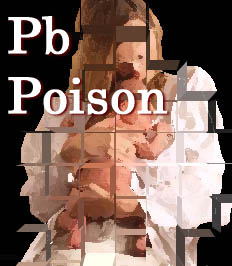

|
Your Child Has Been Poisoned The most important thing for you to understand is that this is serious, potentially fatal, and it can have profound impact on your child's future. The goal of this page is to help you understand the answers you will be hearing and to help you with the question: What do we do now? Click here for Stories from Other Families
"The persistence toxity of lead was seen to result in significant and serious impairment of academic success ... failure to graduate from high school, impairment of reading skills, and deficits in vocabulary, fine motor skills, reaction time and hand-eye coordination." New England Journal of Medicine. |

The EPA estimates that 9,150 children are expected to have an IQ score below 70 as a result of their exposure to lead. Click here for information in Spanish - Click aqui informacion en espanol |
|---|
Lead at low levels is a serious threat to the central nervous systems of infants and children. Lead toxicity in the blood has been found not only to impair early school performance, later grade school performance, but also to negatively affect cognitive functioning into young adulthood. According to a study published in the New England Journal of Medicine in 1990:
"The persistence toxity of lead was seen to result in signifiant and serious impairment of academic success, specifically a seven fold increase in failure to graduate from high school, lower class standing, greater absenteeism, impairment of reading skills sufficiently extensive to be labeled reading disability (indicated by scores two grades below the expected scores), and deficits in vocabulary, fine motor skills, reaction time and hand-eye coordination."
Within the human body, lead damages the nervous system, circulatory and blood forming system, reproductive system, kidneys, and gastro-intestinal tract. In adults lead poisoning can cause various symptoms, including fatigue, loss of appetite, stomach disorders, forgetfulness, headaches, insomnia, irritability, hypertension, anemia, reduced desire for sex, impotence, dizziness, and weakness in the extremities.
It is much more serious when children are exposed to lead. Since the brain has not yet completely developed, lead poisoning can cause learning disabilities, attention deficit disorders, lowered IQ, and anti-social behavior. Elevated levels of lead sustained over a period of time, can damage the central nervous system of children and adversely impact their development.
lead-info.com is a website with a mission to educate with respect to the significance of lead poisoning, especially in children. This site is brought to you by the advocates of the Brain Injury Law Group, a community of plaintiff's trial lawyers across the United States united by a common interest in serving those with brain damage and a common commitment to fully understanding the anatomic, medical and psychological aspects of brain damage.
|
Disclaimer |
The information on this page does not constitute legal advice. The law is constantly changing, and no warranty of the accuracy of information on this site or any site to which we link. |